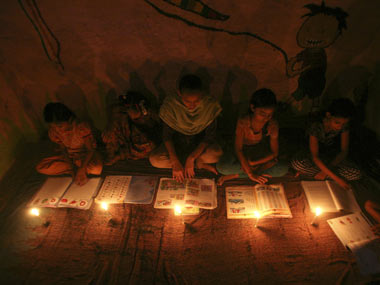When you’re groping in the dark, it’s not always easy to see what’s right in front of your face. Which may explain why on a day when nearly 700 million Indians went without power for hours after three of the five regional power grids collapsed, Congress spokesperson Manish Tewari made another of his famously fatuous remarks to suggest that India wasn’t facing a power crisis after all.
Ensconced in their comfortably air-conditioned living quarters powered up with taxpayer-funded extravaganzas, our leaders may have become blind to the reality of India. But in a larger sense, for some 300 million people in India, there is no power crisis - because, even today, 65 years after independence, they have no access to power at all. Prime Minister Manmohan Singh famously studied by candlelight in his hometown in Gah in Pakistan all those years ago; today, he presides over a country where millions of children across India continue to light a candle to dispel the curse of darkness and illiteracy.
[caption id=“attachment_399341” align=“alignleft” width=“380”]  The New India, circa 2012. Much like the old India, circa 1912. Reuters.[/caption]
And for millions of others, who are so blessed as to have access to power,power-cuts are a daily sufferance: for them, Tuesday’s blackout was extraordinary only for the fact that their daily localised misery was, for once, shared across a wider geography - and made it to the media headlines.
The wonder of the power grid collapse over two successive days across large swathes of India is not that it happened at all, but that it doesn’t happen more often. That’s because the entire economic and political dynamic that underlies India’s power sector - and the larger India story - feeds just such a systemic collapse. It provides incentives for irresponsible behaviour at both the individual and the state levels, and it provides disincentives for economic activity that would have acted as “circuit breakers” to stall endemic crises such as these.
In that sense, the power crisis that has India in its grip today is a metaphor for everything that’s wrong with India: it points to a political class that, in the name of protecting the poor, misprices utilities and resources - and condemns everyone, including the poor, to denial of goods and services.
The power crisis is the price of political populism: by selling electricity lower than the cost of generation, governments have skewed the economic equation and effectively taken away the incentive for more investments in the sector. Add to that the policy muddles, including an extraordinary burst of environmental vigilantism that has cut off coal supplies to power plants, and the political spinelessness that allows the theft of power by political constituencies to go unchecked, and the cycle of bad policies is complete.
All this was of course known to everyone. Committee after committee has over the years waxed eloquently on the need for power sector reforms to incentivise production, given India’s ambitious growth targets, but governments have been loath to taking any difficult decisions in the short term.
Today, a blame-game has broken out among States for overdrawing from the grid, causing it to collapse. There is, of course, plenty of blame to go around, but again this only reflects the short-termism of outlook. The real blame goes much deeper: in the failure to turn on the lights, so to say.
There is, of course, a penalty that State governments must pay for overdrawing from the grid, but the irony is that prices are so skewed that power-deficit States find it cheaper to pay the penalty - rather than procure power from the market. Where, then, is the incentive for good conduct?
Even when States overdraw from the grid, as they manifestly did, there are enough failsafe procedures built into the system, which would have localised the outage. Again, it says something about the larger story of India that these were not activated in time - perhaps because officials’reflexes have slowed over time.
The irony is that there are examples to show that power sector reforms, if embraced at the State level, can work wonders. Illustratively, Gujarat has demonstrated that by providing the right price incentives - and by curtailing power theft - it is possible to generate power surplus even after providing 24x7 power, not just in the big cities but in all the villages as well.
As the Wall Street Journal notes, Gujarat Chief Minister Narendra Modi has displayed “political gumption and policy creativity” by, first, curbing the theft of power, and, more importantly, by setting up a parallel distribution network to sell farmers power at competitive prices. “Consumers can still access the old grid at subsidised prices, but they’re increasingly turning to the new one for stable supply.”
But, of course, in the hyperpartisan environment we live in today, where parties only believe in posturing on the political plane by calling Modi names , these achievements will go unacknowledged. That too is a defining story of India.
On the other hand, mediocrity will be instantly rewarded, as when Power Minister Sushil Kumar Shinde, who has over the past two days exhibited extraordinary cluelessness about the power crisis, gets a promotion to the weightier Home portfolio - merely on the strength of the fact that he is “loyal” to India’s foremost political dynasty. Again, where is the incentive to perform?
Even 65 years after independence, we’re still grappling with fundamental _bijli-sadak-pani_issues, and have made not the feeblest effort at addressing these foundational failings. That perhaps is the metaphor for an India that is fated to remain an underperformer - and for a people that are entirely powerless in more ways than one.


)
)
)
)
)
)
)
)
)



